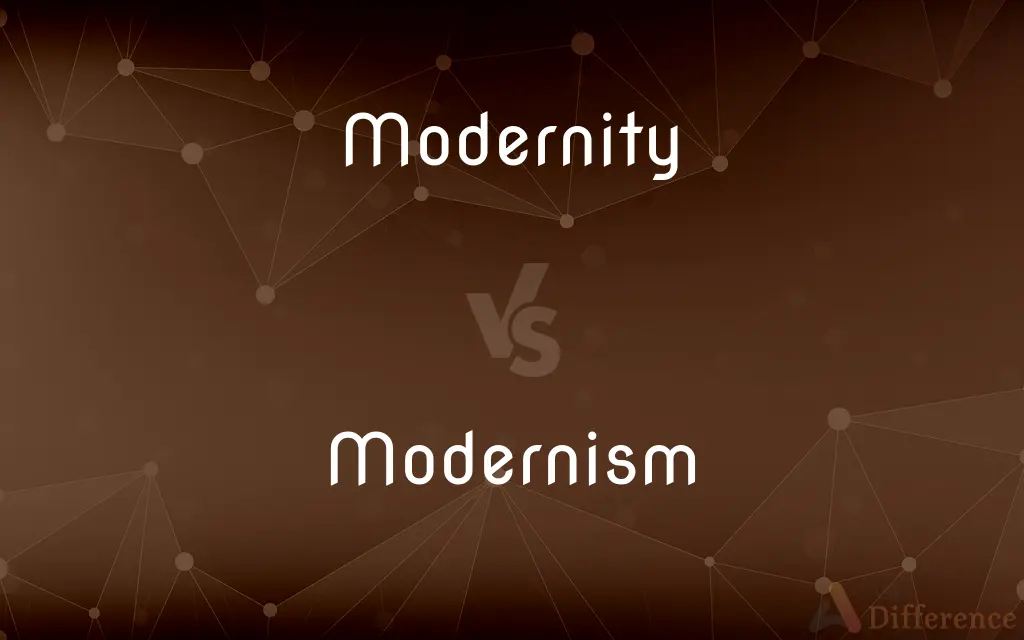Modernity vs. Modernism — What's the Difference?
Edited by Tayyaba Rehman — By Fiza Rafique — Updated on October 5, 2023
Modernity relates to social and cultural features of contemporary or recent times, whereas Modernism is an artistic and cultural movement that emerged in response to those conditions.

Difference Between Modernity and Modernism
Table of Contents
ADVERTISEMENT
Key Differences
Modernity signifies a period or condition historically identified with the progress, modes, and norms post-Enlightenment, highlighting industrialization, secularization, and rationalization. Modernism, on the contrary, is an intentional departure from tradition, evident in arts, architecture, literature, and even philosophy, expressing an active alignment with the changing norms and conditions identified with modernity.
Focusing on societal shifts, Modernity involves aspects such as technological advancements, urbanization, and societal restructuring, emphasizing the evolving and the present. Modernism, then, involves an embrace and, often, a celebration of those changes, representing them in innovative and often abstract, non-traditional forms and structures in various cultural and artistic expressions.
While Modernity encompasses political, social, and economic transformations, reflecting the contemporaneity of society, its zeitgeist, Modernism can be considered a critical reflection and often, a critique, of these transformations, artistically and culturally commenting on, dissecting, and redefining the notions of modernity.
In Modernity, rationality, science, and industry are fundamental pillars, advocating progress and often showing faith in an advanced and improved society. Modernism, however, whilst born of modernity, frequently challenges the very notions of progress, narrating the disruptions, alienations, and challenges that arrive with the new conditions of existence.
By exploring Modernity, one might observe societal frameworks, norms, and conditions that signify contemporary or recent times, especially in the context of social, technological, and cultural advancements. Modernism, observing through a lens that is both reflective and critical, offers cultural, aesthetic, and philosophical dialogues, providing nuanced, divergent, and often revolutionary perspectives on the conditions and impacts of modernity.
ADVERTISEMENT
Comparison Chart
Definition
A condition or mode of contemporary times.
An artistic/cultural movement responding to modernity.
Pertains To
Social, cultural, and technological aspects.
Artistic, architectural, and cultural expressions.
Temporal Focus
Current, evolving, or recent periods.
A historical/cultural period and its after-effects.
Role
Describes societal and cultural conditions.
Expresses, critiques, or celebrates those conditions.
Expresses
Societal and technological advancements.
Artistic and cultural response to those advancements.
Compare with Definitions
Modernity
The quality or condition of being modern.
Modernity is often associated with technological progress.
Modernism
A cultural and artistic movement rejecting traditional forms.
Modernism in literature embraced a nonlinear narrative style.
Modernity
The cultural and societal modes of an existing or recent era.
Modernity brings forth a set of new societal norms.
Modernism
Artistic and cultural expressions reflecting or critiquing modernity.
The stark, minimal architecture was reflective of modernism.
Modernity
A phase marked by the rejection of traditions.
The rise of secularism is one aspect of modernity.
Modernism
The pursuit of novel forms of expression in art and architecture.
Modernism seeks to interpret the complexities of the new era.
Modernity
Current, contemporary, or recent times and their characteristics.
The city was a showcase of modernity and innovation.
Modernism
A philosophical stance promoting the departure from traditional forms.
Modernism, to many, symbolizes a break from conventional aesthetics.
Modernity
The state or quality of being modern
"Warriors of the ... tribe, imposing symbols of a nomadic culture ... are caught between tradition and modernity" (Sheila Rule).
Modernism
An intentional alignment with and often critique of modernity in cultural expressions.
The works of James Joyce were steeped in the ethos of modernism.
Modernity
The quality of being modern or contemporary.
He was impressed by the architecture's modernity.
Modernism
Modernism is both a philosophical movement and an art movement that arose from broad transformations in Western society during the late 19th and early 20th centuries. The movement reflected a desire for the creation of new forms of art, philosophy, and social organization which reflected the newly emerging industrial world, including features such as urbanization, new technologies, and war.
Modernity
Modern times.
The organization survived from ancient times to modernity.
Modernism
Modern thought, character, or practice.
Modernity
(history) Quality of being of the modern period of contemporary historiography.
Modernism
Sympathy with or conformity to modern ideas, practices, or standards.
Modernity
Modernness; something modern.
Modernism
A peculiarity of usage or style, as of a word or phrase, that is characteristic of modern times.
Modernity
The quality of being current or of the present;
A shopping mall would instill a spirit of modernity into this village
Modernism
Often Modernism The deliberate departure from tradition and the use of innovative forms of expression that distinguish many styles in the arts and literature of the 1900s.
Modernity
An epoch characterized by the prevalence of capitalistic economies.
The factories symbolized the harsh realities of modernity.
Modernism
Often Modernism A Roman Catholic movement, officially condemned in 1907, that attempted to examine traditional belief according to contemporary philosophy, criticism, and historiography.
Modernism
(uncountable) Modern or contemporary ideas, thought, practices, etc.
Modernism
(countable) Anything that is characteristic of modernity.
Modernism
Any of several styles of art, architecture, literature, philosophy, etc., that flourished in the 20th century.
Modernism
A religious movement in the early 20th century, condemned as heretical by Pope Pius X, which tried to reconcile Roman Catholic dogma with modern science and philosophy.
Modernism
Modern practice; a thing of recent date; esp., a modern usage or mode of expression.
Modernism
Certain methods and tendencies which, in Biblical questions, apologetics, and the theory of dogma, in the endeavor to reconcile the doctrines of the Roman Catholic Church with the conclusions of modern science, replace the authority of the church by purely subjective criteria; - so called officially by Pope Pius X.
Modernism
Genre of art and literature that makes a self-conscious break with previous genres
Modernism
The quality of being current or of the present;
A shopping mall would instill a spirit of modernity into this village
Modernism
Practices typical of contemporary life or thought
Common Curiosities
What are key features of modernity?
Features include rationalism, individualism, secularism, urbanization, technological advancement, and the decline of traditional forms of authority.
When did modernity begin?
Modernity's onset is debated, but it is often associated with the late 18th to early 19th centuries, coinciding with the Enlightenment and the Industrial Revolution.
What is modernity?
Modernity refers to the cultural, social, and economic conditions and characteristics that emerged in Western society after the Renaissance.
How is modernity different from being modern?
Being modern relates to the present time or recent times, while modernity refers to a historical period and its associated characteristics.
Is postmodernity the same as modernity?
No. Postmodernity is a reaction to or evolution from modernity, challenging its foundational concepts.
What forms did modernism take in art?
In art, modernism saw the rise of abstract, experimental, and non-representational forms.
How have modernity and modernism influenced literature?
They introduced new narrative techniques, themes of alienation, and a focus on individual consciousness.
Why was modernism controversial?
Modernism often challenged traditional values, norms, and forms, leading to both admiration and criticism.
Are modernism and postmodernism the same?
No. Postmodernism emerged after modernism and often critiques or deviates from its principles.
Do all cultures experience modernity in the same way?
No. The experience of modernity can vary based on cultural, historical, and regional factors.
Are modernity and modernism still relevant today?
Yes. While both terms originated in the past, their influences and the debates they provoke remain significant in contemporary discussions.
How do modernity and modernism relate?
Modernism is a cultural and artistic response to the conditions of modernity.
What is modernism?
Modernism is a cultural and artistic movement that emerged in the late 19th and early 20th centuries, characterized by a deliberate break from traditional styles and values.
Can a society have modernity without modernism?
Yes. A society can experience the socio-economic changes of modernity without necessarily embracing the cultural/artistic expressions of modernism.
How do modernity and modernism relate to globalization?
Both concepts have contributed to globalization. Modernity, with technological and economic shifts, and modernism, through the spread of new cultural forms.
Share Your Discovery

Previous Comparison
Liquid vs. Solution
Next Comparison
Loving vs. LovelyAuthor Spotlight
Written by
Fiza RafiqueFiza Rafique is a skilled content writer at AskDifference.com, where she meticulously refines and enhances written pieces. Drawing from her vast editorial expertise, Fiza ensures clarity, accuracy, and precision in every article. Passionate about language, she continually seeks to elevate the quality of content for readers worldwide.
Edited by
Tayyaba RehmanTayyaba Rehman is a distinguished writer, currently serving as a primary contributor to askdifference.com. As a researcher in semantics and etymology, Tayyaba's passion for the complexity of languages and their distinctions has found a perfect home on the platform. Tayyaba delves into the intricacies of language, distinguishing between commonly confused words and phrases, thereby providing clarity for readers worldwide.














































